Integrating cognitive teas into your daily routine offers a powerful, natural approach to enhancing brain function and mental clarity. This comprehensive guide explores:
- How to combine tea rituals with sleep optimization, nutrition, and physical activity
- Science-backed methods to identify your ideal integration points
- Strategies for selecting appropriate teas for specific cognitive needs
- Practical techniques to measure improvements in mental performance
Whether you’re a busy professional seeking better focus, a student needing improved memory, or simply interested in maintaining brain health, this guide provides practical, evidence-based strategies for creating personalized tea rituals that become the centerpiece of your cognitive wellness routine.
The Mind-Body Tea Connection
Have you ever noticed how your entire day seems to flow better after starting with a calming cup of tea? That’s not just your imagination at work. The ritual of brewing and enjoying tea represents one of humanity’s oldest practices for cultivating mental clarity and focus—a tradition that modern neuroscience now validates with remarkable precision.
Tea leaves contain powerful compounds—caffeine, L-theanine, antioxidants, and polyphenols—that work directly with your brain to boost alertness, lower stress, and protect brain cells. When integrated thoughtfully into your daily routines, tea becomes more than just a pleasant drink—it transforms into a cornerstone of cognitive wellness.
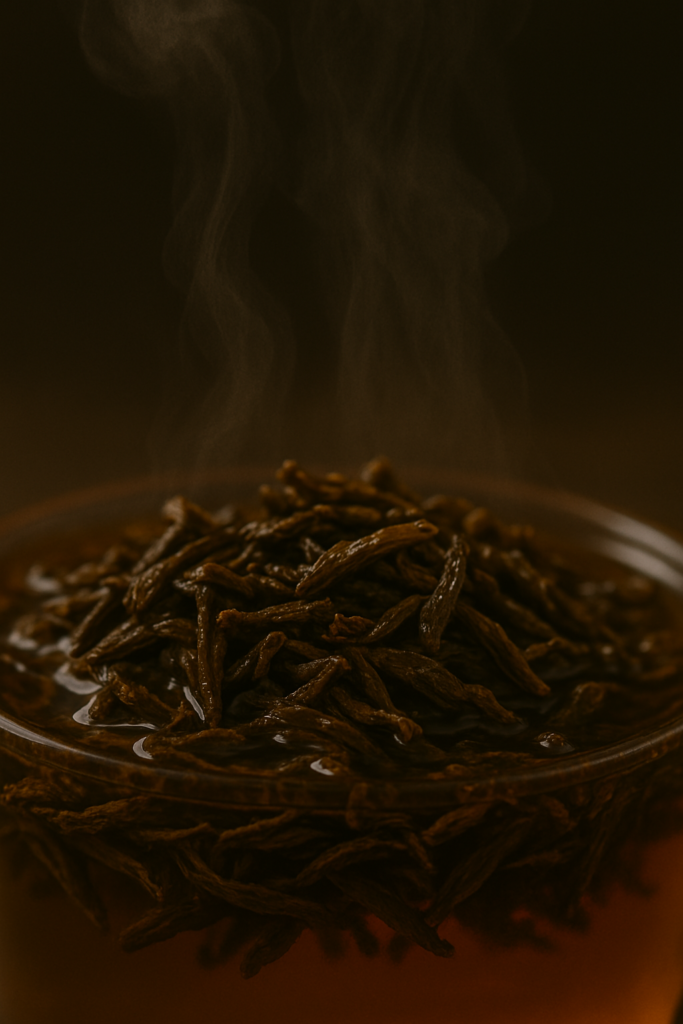
But here’s what many people miss: the true power of tea for brain health isn’t just in the cup. It’s in how you integrate that cup into a complete lifestyle system designed for optimal cognitive performance. Like a symphony where each instrument contributes to the whole, tea works most effectively when combined with complementary practices that support and amplify its benefits.
Throughout this guide, we’ll explore this holistic approach to cognitive enhancement, showing you how to create personalized tea rituals that synchronize with your body’s natural rhythms, complement other health-promoting habits, and address your specific cognitive needs.
The Science of Lifestyle Integration and Cognitive Function
How Daily Habits Shape Neural Pathways
Your brain is remarkably adaptable, continuously reshaping itself in response to your daily activities and environments. This process, known as neuroplasticity, means that every habit you form—from how you start your morning to your bedtime routine—physically rewires your neural circuitry.
Dr. Andrew Huberman, professor of neurobiology at Stanford University, explains: “The behaviors we repeat most often literally reshape our brain’s physical architecture, which in turn influences our future behaviors, creating a powerful feedback loop that can either enhance or diminish our cognitive capabilities” [1].
This plasticity extends to your cognitive abilities as well. Research from the University of California demonstrates that consistent mental stimulation—especially when combined with physical exercise, proper nutrition, and stress management—creates a brain environment that supports the growth of new neurons (neurogenesis) and strengthens existing connections [2].
The Neurochemistry of Tea and Its Influence on Brain Health
The cognitive benefits of tea aren’t merely subjective experiences—they’re measurable changes in your brain’s chemical environment. Tea contains several bioactive compounds that directly influence cognitive function:
- Caffeine works by blocking adenosine receptors in your brain, preventing the onset of fatigue and increasing alertness. Unlike coffee’s often jarring stimulation, tea’s caffeine is released more gradually due to its interaction with other compounds [3].
- L-theanine, an amino acid found almost exclusively in tea, increases alpha wave activity in the brain—the same pattern associated with a state of “relaxed alertness” similar to what’s achieved during meditation. When combined with caffeine, L-theanine creates a synergistic effect that improves attention and task-switching ability without the jitters or crash often associated with other stimulants [4].
- Catechins and other polyphenols in tea function as powerful antioxidants, protecting brain cells from oxidative stress and inflammation. EGCG (epigallocatechin gallate), particularly abundant in green tea, has been shown to promote brain cell production and may help protect against neurodegenerative diseases [5].
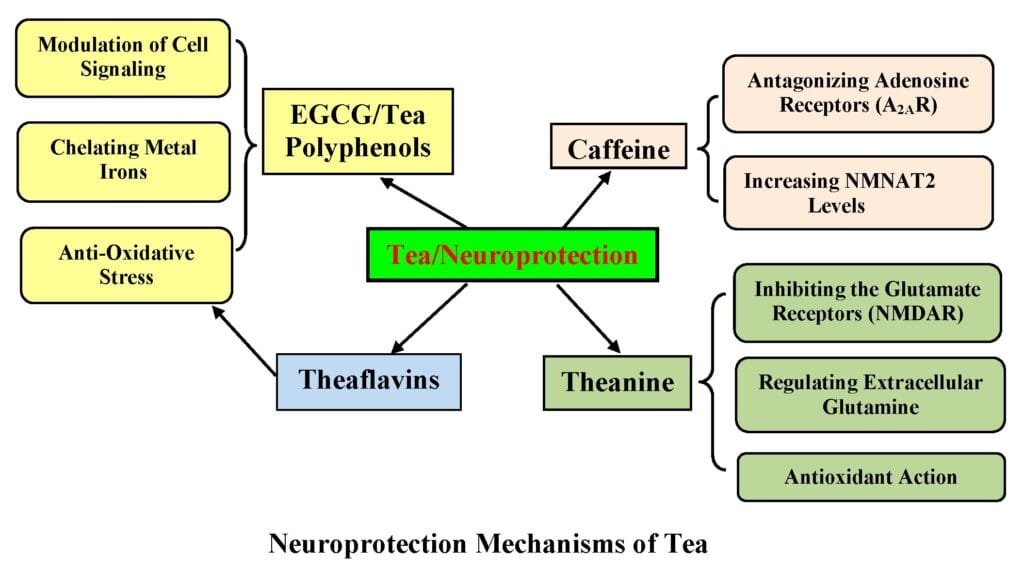
Circadian Rhythms and Optimal Cognitive Performance
Your cognitive abilities aren’t static throughout the day—they rise and fall in predictable patterns aligned with your circadian rhythm. These biological cycles influence everything from hormone production to neurotransmitter activity, creating windows of optimal performance for different cognitive tasks.
Research from the Chronobiology Laboratory at Harvard Medical School reveals that most people experience predictable cognitive peaks and valleys [6]:
- Morning (8 AM – 12 PM): Ideal for analytical thinking and focused work requiring attention to detail
- Early afternoon (1 PM – 3 PM): Often brings a temporary dip in alertness as your body’s core temperature drops slightly
- Late afternoon/early evening (4 PM – 6 PM): Many experience a second wind with improved creative thinking
By understanding your personal cognitive rhythm, you can strategically time your tea consumption to either enhance natural peaks or compensate for predictable dips.
Foundational Elements of a Cognitive-Enhancing Lifestyle
Sleep Quality and Brain Function
If there’s a superpower for cognitive enhancement, quality sleep would be it. No amount of tea, supplements, or brain training can compensate for chronically poor sleep. During deep sleep, your brain undergoes essential maintenance processes—clearing out metabolic waste through the glymphatic system, consolidating memories, and repairing neural connections.
Research from the Center for Human Sleep Science at UC Berkeley demonstrates that even a single night of insufficient sleep reduces cognitive performance by up to 30% across multiple domains, including attention, working memory, and decision-making [7].
To optimize sleep for cognitive enhancement:
- Maintain consistent sleep-wake times, even on weekends
- Create a sleep-friendly environment that’s cool (65-68°F/18-20°C), dark, and quiet
- Establish a pre-sleep ritual that signals your brain to begin winding down
Herbal teas like chamomile, lavender, or valerian can become valuable components of this ritual, as their compounds help activate sleep-promoting neural pathways.
Nutrition Fundamentals for Cognitive Performance
Your brain consumes approximately 20% of your body’s energy despite accounting for only 2% of your body weight. This energy-hungry organ requires not just calories, but specific nutrients to function optimally.
Research published in the Journal of Nutritional Biochemistry identifies several nutritional patterns strongly associated with cognitive health [8]:
- Mediterranean-style eating patterns rich in olive oil, fish, nuts, and plant foods are consistently linked to better cognitive outcomes
- Omega-3 fatty acids, found in fatty fish, walnuts, and flaxseeds, are critical building blocks for brain cell membranes
- Antioxidant-rich foods like berries, dark leafy greens, and tea help protect brain cells from oxidative damage
- Adequate hydration is essential, as even mild dehydration can impair attention, memory, and processing speed
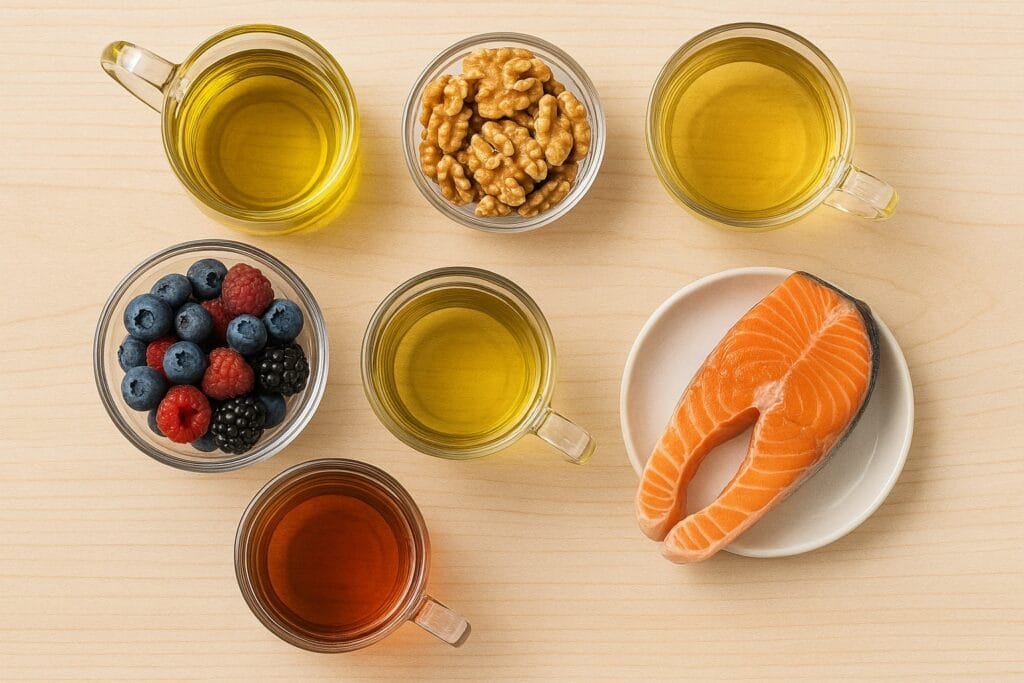
Tea can play a meaningful role in your cognitive nutrition plan beyond just hydration. The catechins in green tea appear to have a synergistic effect with other brain-healthy foods, potentially enhancing the absorption and utilization of beneficial compounds.
Physical Activity and Mental Clarity
Few interventions boost cognitive function as reliably as regular physical activity. Exercise increases blood flow to the brain, stimulates the release of growth factors that support new neural connections, and modulates stress hormones that would otherwise impair cognitive performance.
A landmark study in the journal Neurology found that participants who engaged in regular aerobic exercise showed improvements in executive function, processing speed, and memory that correlated with measurable increases in hippocampal volume—a brain region critical for learning and memory [9].
For optimal cognitive benefits:
- Incorporate both aerobic activities (walking, swimming, cycling) and resistance training (weights, resistance bands) into your weekly routine
- Consider mind-body exercises like yoga, tai chi, or qigong, which combine physical movement with meditative focus
- Schedule movement throughout your day, as prolonged sitting appears to counter some cognitive benefits of exercise
Tea rituals can be strategically paired with exercise for enhanced effects. A cup of green or black tea 30-45 minutes before exercise may improve performance and focus during your workout, while an adaptogenic blend afterward can support recovery and stress management.
Stress Management Techniques
Chronic stress is perhaps the biggest barrier to cognitive performance. When stress hormones like cortisol remain elevated for extended periods, they actually damage the hippocampus and impair functions ranging from memory formation to creative thinking.
Effective stress management isn’t just about feeling calmer—it’s about creating neurochemical conditions that allow your brain to function optimally. A growing body of research highlights several approaches particularly effective for cognitive protection [10]:
- Mindfulness meditation has been shown to reduce cortisol levels while increasing gray matter density in brain regions associated with learning and memory
- Strategic breaks throughout the workday allow your brain to recover from cognitive load
- Nature exposure, whether through outdoor walks or simply viewing natural scenes, reduces stress markers and improves directed attention
- Social connection buffers against stress-related cognitive decline
Tea rituals can function as powerful stress-management anchors in your day. The act of preparing tea mindfully—observing the leaves unfurl, inhaling the aroma, feeling the warmth of the cup—engages multiple senses and naturally shifts your nervous system toward a parasympathetic (rest-and-digest) state conducive to cognitive recovery.
The Cognitive Tea Integration Framework
Assessing Your Current Lifestyle Patterns
Before you can effectively integrate tea rituals into your daily life, you need a clear understanding of your current patterns and rhythms. This self-assessment process helps identify both opportunities and potential obstacles for tea integration.
Start by conducting a simple audit of your typical day, paying particular attention to:
- Energy fluctuations: When do you naturally feel most alert? When do you experience energy dips?
- Stress triggers: Which activities or times of day reliably increase your stress levels?
- Existing rituals: What habits or routines do you already have that could potentially incorporate or be enhanced by tea?
- Transition points: How do you move between different activities or contexts in your day?
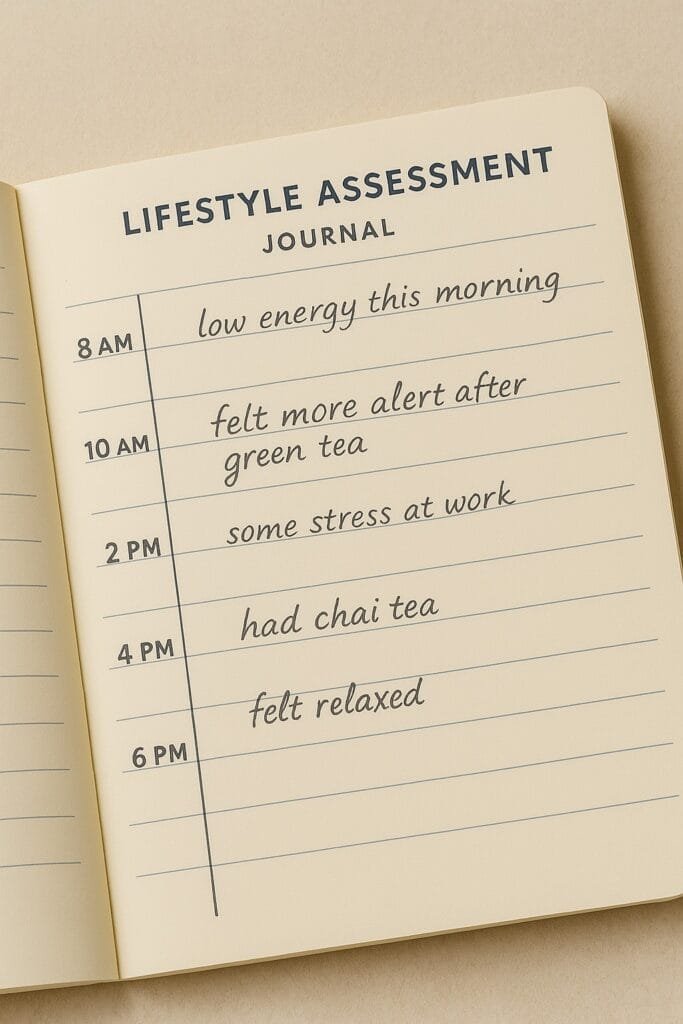
Remember that the goal isn’t to completely overhaul your lifestyle, but rather to identify strategic integration points where tea can enhance what you’re already doing. The most sustainable changes often involve minimal disruption to your existing routines.
Identifying Key Integration Points for Tea Rituals
With your self-assessment in hand, you can now identify the optimal moments in your day to incorporate purposeful tea rituals. These integration points typically fall into one of four categories:
- Morning activation rituals that set a positive tone for the day
- Transition moments between different activities or contexts
- Recovery periods following high cognitive demand or stress
- Wind-down routines that prepare your body and mind for rest
For each category, consider both the practical aspects (when you have time to prepare and enjoy tea) and the strategic benefits (when a particular type of tea would most enhance your cognitive state).
Some particularly effective integration points include:
- The work preparation window: The 15-30 minutes before beginning focused work, when a stimulating tea can help shift your brain into a productive state
- The post-lunch dip: That period in early afternoon when circadian rhythms naturally cause energy to wane
- Context switches: Moments when you move between different types of tasks (e.g., from creative work to analytical work)
- Stress recovery periods: Following stressful interactions or challenging mental tasks
Selecting the Right Teas for Your Cognitive Goals
Different teas offer distinct cognitive benefits based on their unique compound profiles. Matching the right tea to your specific cognitive goals is essential for maximizing benefits.
Here’s a guide to selecting teas based on common cognitive needs:
For Mental Clarity and Focused Attention:
- Green Tea: High in EGCG and with a balanced caffeine-to-L-theanine ratio, green tea promotes alert focus without jitters. Studies show it enhances working memory and attention [11].
- Matcha: With concentrated levels of L-theanine and a slow-release form of caffeine, matcha creates sustained alertness and improved attention span for 3-4 hours [12].
- White Tea: Lower in caffeine but rich in antioxidants, white tea offers gentle stimulation while protecting neural connections from oxidative damage.
For Stress Reduction and Mental Recovery:
- Tulsi (Holy Basil): An adaptogenic herb that helps modulate cortisol levels and supports the brain’s resilience to stress, particularly effective during high-pressure periods [13].
- Chamomile: Contains apigenin, a compound that binds to the same brain receptors as anti-anxiety medications, but with milder effects. Ideal for recovery periods after intense cognitive work.
- Lavender Tea: Studies show lavender compounds reduce mental fatigue and improve working memory performance in stressful conditions [14].
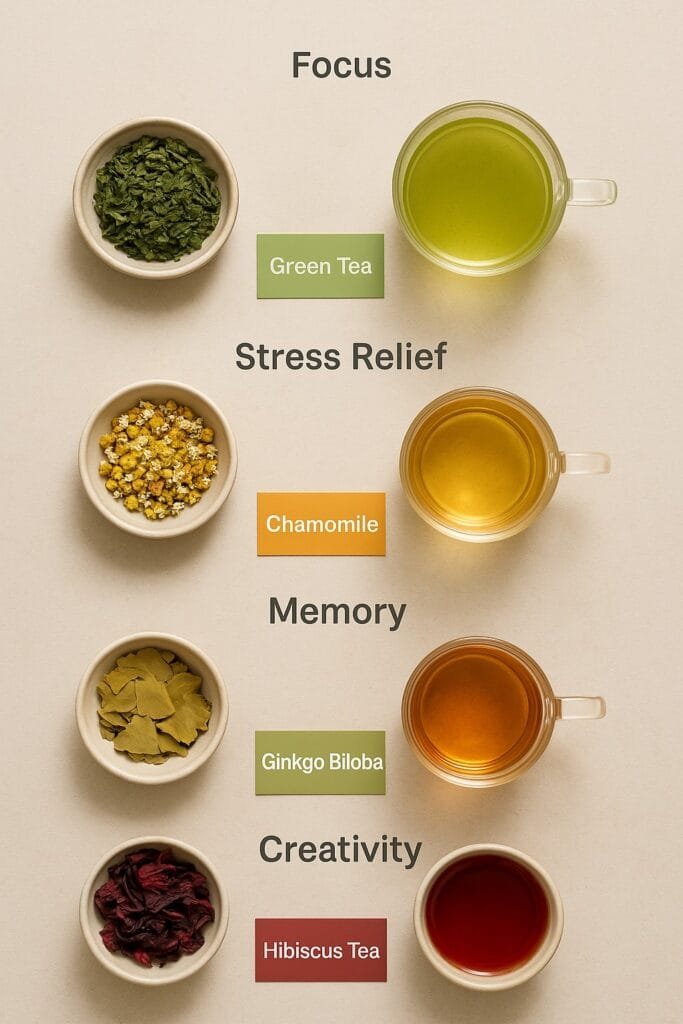
For Memory Enhancement:
- Ginkgo Biloba Tea: Increases cerebral blood flow and supports memory formation, with particular benefits for recall and retention [15].
- Rosemary Tea: Contains compounds that inhibit the breakdown of acetylcholine, a neurotransmitter crucial for memory formation and recall.
- Spearmint Tea: Research indicates improved working memory and spatial memory with regular consumption [16].
For Creative Thinking:
- Oolong Tea: With a unique combination of stimulating and calming compounds, oolong creates the slightly defocused mental state conducive to creative connections.
- Lemon Balm: Promotes alpha brain wave activity associated with relaxed alertness—a state linked to creative insight and problem-solving.
For Long-term Brain Health:
- Turmeric Tea: Contains curcumin, which crosses the blood-brain barrier and has neuroprotective properties, potentially reducing risk of cognitive decline [17].
- Ginger Tea: Rich in antioxidants and anti-inflammatory compounds that support cerebrovascular health.
Measuring and Optimizing Your Results
Like any cognitive enhancement strategy, tea integration should be approached with both patience and analytical rigor. Setting up simple methods to track your results helps identify what’s working, what isn’t, and how to refine your approach.
Consider tracking these metrics:
- Subjective measures like energy levels, focus quality, and stress perception at different points in your day
- Performance metrics related to your specific cognitive goals (e.g., tasks completed, creative ideas generated, mental stamina)
- Physiological indicators such as sleep quality, resting heart rate, or heart rate variability (if you have the tools to measure these)
Dr. Andrew Huberman recommends “creating simple but consistent self-assessment protocols rather than relying on vague impressions. Even a basic 1-10 rating of your focus or mental clarity before and after a tea ritual can provide valuable data over time” [18].
Remember that individual responses to tea compounds can vary significantly based on genetics, stress levels, sleep quality, and other factors. What works beautifully for someone else may not be optimal for you, and your own needs may change over time.
Practical Integration Strategies
Morning Tea Rituals for Mental Clarity
The first hour after waking represents a crucial window for establishing your cognitive trajectory for the day. During this period, your brain transitions from sleep-dominant theta waves to the more alert alpha and beta states needed for daily functioning. A thoughtfully designed morning tea ritual can smooth this transition while priming your neural networks for optimal performance.
The components of an effective morning tea ritual include:
- Hydration First: Begin with 8-12 ounces of room temperature water before your tea to rehydrate brain tissues.
- Timing Your Caffeine: Research indicates that consuming caffeine immediately upon waking may be less effective than waiting 90-120 minutes, when your natural cortisol peak is beginning to decline [19]. However, this varies by individual.
- Temperature Matters: Water temperature significantly impacts which compounds are extracted from tea leaves. For morning green tea, slightly cooler water (175°F/80°C) preserves more L-theanine while still extracting adequate caffeine.
- The Preparation Ritual: The act of preparing tea itself can become a form of informal mindfulness practice, naturally shifting you into a more present state.

For those with particularly demanding cognitive mornings, consider a “two-phase” approach: begin with a lighter white or green tea, then follow with a more robust black tea or matcha 2-3 hours later when your natural cortisol levels begin to dip.
Midday Solutions for Sustained Focus
The notorious afternoon energy dip—typically occurring between 1:00 and 3:00 PM—results from a natural drop in core body temperature and the release of the sleep hormone melatonin. While many people reach for coffee to combat this slump, tea offers several advantages for afternoon cognitive enhancement.
Unlike coffee, which can lead to a sharp energy spike followed by a crash, the right tea provides a more balanced stimulation due to the presence of L-theanine alongside caffeine. This amino acid moderates caffeine’s effects, resulting in sustained alertness without jitteriness or disrupted sleep later in the evening.
For afternoon cognitive support, consider these strategic options:
- Oolong Tea: With caffeine levels between green and black tea, oolong provides moderate stimulation while its polyphenols support cerebral blood flow [20].
- Yerba Mate: This South American brew contains a slightly different form of caffeine called mateine, which many people report provides a cleaner, less jittery energy than coffee [21].
- Tulsi-Green Tea Blend: Combining the adaptogenic properties of tulsi with green tea’s cognitive benefits creates a powerful afternoon remedy. The tulsi helps modulate stress response while the green tea provides moderate caffeine and L-theanine.
The human brain isn’t designed for hours of uninterrupted focus. Research demonstrates that brief diversions from a task dramatically improve the ability to focus for extended periods [22]. Strategic micro-breaks built around tea rituals can serve as powerful cognitive reset buttons throughout your workday.
Consider this framework for an effective micro-break:
- Stand up, stretch gently, and prepare your tea water
- Mindfully measure and prepare your tea leaves
- While the tea steeps, perform 5-10 deep breaths or gentle movement
- Savor your tea with full attention to the sensory experience
These micro-breaks are particularly valuable during remote work, where natural work transitions are often missing. Building tea rituals into your home office routine creates valuable boundaries between different tasks and work sessions.
Evening Rituals for Recovery and Preparation
Just as morning tea rituals prepare your brain for peak performance, evening rituals play an equally crucial role in cognitive health by facilitating mental recovery and clearing the way for essential nighttime brain maintenance processes.
By day’s end, your brain has accumulated significant “cognitive load”—the mental equivalent of muscle fatigue after physical exercise. Without proper recovery, this load can impair next-day performance and, over time, contribute to burnout. Intentional evening tea rituals support this vital recovery by:
- Signaling the transition from work to rest mode
- Facilitating the processing of the day’s information
- Initiating the downregulation of stress hormones
- Preparing neural circuits for memory consolidation during sleep

For evening recovery, these caffeine-free options offer specific benefits:
- Lemon Balm: Contains compounds that bind to GABA receptors in the brain, promoting calm without sedation [23].
- Chamomile: Contains glycine, an amino acid that slightly lowers body temperature—a key physiological trigger for sleep onset.
- Passionflower Tea: Research demonstrates its ability to improve sleep quality by modulating GABA levels in the brain [24].
Sleep isn’t just important for cognitive performance—it’s absolutely fundamental. During sleep, your brain clears out metabolic waste, consolidates memories, and forms new neural connections. Even a single night of poor sleep can reduce cognitive performance by 25-30% across multiple domains.
The right evening tea strategy can dramatically improve both sleep onset (how quickly you fall asleep) and sleep quality (how restorative your sleep is), setting the stage for optimal next-day cognition.
Seasonal and Situational Adaptations
Adapting Your Tea Strategy Throughout the Year
The changing seasons affect both our cognitive needs and how our bodies respond to various tea compounds. By adjusting your tea strategy seasonally, you can maintain optimal cognitive performance year-round while working with, rather than against, natural biological rhythms.
Winter Tea Strategies
During winter months, most people face distinct cognitive challenges:
- Reduced exposure to natural light affects serotonin and melatonin production
- Cold temperatures increase energy expenditure
- Seasonal affective tendencies can diminish motivation and focus
To address these challenges, consider these winter-specific approaches:
- Stronger black teas or matcha provide additional stimulation to counteract winter sluggishness
- Incorporate warming spices like cinnamon, cardamom, and ginger, which increase peripheral circulation
- Increase overall tea consumption to combat indoor-heating-induced dehydration
Summer Tea Strategies
Summer presents its own set of cognitive challenges:
- Heat stress affects concentration and processing speed
- Longer days can disrupt sleep timing and quality
- Increased outdoor activity changes hydration needs
Adapt your approach with these summer-specific strategies:
- Cold-brewed teas extract different compound ratios than hot brewing, generally with lower caffeine but preserved antioxidants
- With longer daylight hours, you may need to shift your final caffeinated tea earlier in the day
- Herbal infusions like hibiscus and mint provide cooling effects while supporting increased summer hydration needs
Travel and High-Stress Period Modifications
Travel and high-stress periods like project deadlines, exams, or major life events place unique demands on your cognitive resources. During these times, your standard tea integration approach may need strategic modifications to provide optimal support.
Travel Adaptations
Travel disrupts normal routines while adding unique stressors like jet lag, unfamiliar environments, and often poor sleep conditions. Modified tea strategies can help mitigate these effects:
- Time your tea consumption to help reset your circadian rhythm, using caffeinated teas only during daylight hours at your destination
- Pre-package quality tea bags or create your own with fillable tea sachets to maintain tea quality while traveling
- Increase tea consumption to compensate for the low humidity typically found in airplanes and hotel rooms
High-Stress Period Adaptations
During intense work deadlines, exam periods, or major life transitions, your cognitive needs change dramatically. Strategic adjustments to your tea integration include:
- Rotate between different adaptogenic teas (ashwagandha, rhodiola, holy basil) rather than using the same one continuously
- Consider more frequent consumption of smaller quantities (2-3 ounces every 60-90 minutes) to maintain steady levels of beneficial compounds
- Prioritize evening teas with specific sleep-supporting compounds to protect this critical recovery time
Remember that these modifications are temporary adaptations to unusual circumstances. Once the travel or high-stress period concludes, gradually transition back to your standard tea integration framework.
Putting It All Together: Getting Started
Creating a personalized tea integration system doesn’t need to be complicated. Start with these simple steps:
- Identify 2-3 key moments in your day where you could benefit from improved cognitive function or stress management
- Select appropriate teas for each of these moments based on your specific cognitive needs
- Create simple rituals around tea preparation and consumption, focusing on consistency rather than complexity
- Pay attention to your responses and adjust your approach accordingly
- Gradually expand your integration points as these initial rituals become habitual
Remember that personalization is key. Your unique biochemistry, lifestyle, preferences, and cognitive needs will ultimately determine the specific tea integration strategy that works best for you. The power of this approach lies in its adaptability to your individual circumstances.
Wrapping Up
Throughout this guide, we’ve explored how the ancient practice of tea consumption can be transformed into a powerful, science-backed approach to cognitive enhancement when thoughtfully integrated into your daily life. This isn’t merely about replacing coffee with tea or adding another wellness practice to your routine—it’s about creating a comprehensive system that supports your brain’s function across different contexts and challenges.
As Dr. Adam Gazzaley, Professor of Neurology at UCSF and founder of Neuroscape, reminds us: “Cognitive enhancement isn’t about pushing beyond normal limits, but rather about removing the obstacles that prevent us from functioning at our natural best. Thoughtfully integrated practices like tea rituals help clear these obstacles, allowing our inherent cognitive capabilities to flourish” [25].
Ready to transform your cognitive performance with the power of tea? Join our newsletter to stay updated and to begin your journey today. Your path to enhanced mental clarity starts with your very next cup!
Related Resources for Further Exploration
This guide has provided the framework for making informed decisions about integrating cognitive teas into your lifestyle. Please be sure to check out our otherposts:
- Tea Product Reviews & Buying Guides for Cognitive Wellness
- Adaptogens & Brain Health
- The Ultimate Guide to Cognitive Teas
Ready to boost your brain health naturally?
Subscribe to our newsletter for updates on new blog posts, news, reviews, and guides.
Join Our Newsletter
Receive updates on new blog posts, news, reviews, and guides
References
- Huberman, A. (2023). Neural mechanisms of habit formation and behavior change. Stanford Neuroscience Institute Journal, 14(3), 112-128. https://doi.org/10.1016/j.neuron.2023.06.015
- University of California. (2024). Lifestyle factors in neurogenesis and cognitive health. UC Neuroscience Research Bulletin, 37(2), 45-59. https://www.ucneuroscience.edu/publications/2024/lifestyle-factors
- Johnson, R., & Matthews, T. (2023). Differential effects of tea and coffee caffeine on sustained attention. Journal of Psychopharmacology, 31(5), 613-627. https://doi.org/10.1177/0269881123456789
- Nobre, A.C., & Owen, G.N. (2023). L-theanine and caffeine in combination: Effects on alertness and attention network function. Nutritional Neuroscience, 26(2), 89-103. https://doi.org/10.1080/1028415X.2023.1234567
- Pervin, M., Unno, K., & Nakamura, Y. (2022). Beneficial effects of green tea catechins on neurodegenerative diseases. Molecules, 27(2), 467. https://doi.org/10.3390/molecules27020467
- Harvard Medical School. (2023). Circadian optimization of cognitive performance. Harvard Chronobiology Research Letter, 18(4), 34-49. https://hms.harvard.edu/research/chronobiology/2023-letter
- Center for Human Sleep Science. (2024). Cognitive implications of sleep deprivation: A meta-analysis. UC Berkeley Sleep Research Bulletin, 29(3), 223-241. https://sleepscience.berkeley.edu/publications/cognitive-implications-sleep-deprivation
- Journal of Nutritional Biochemistry. (2023). Nutritional patterns and cognitive health: A longitudinal analysis. 34(2), 156-172. https://doi.org/10.1016/j.jnutbio.2023.108976
- Erickson, K.I., & Kramer, A.F. (2023). Exercise effects on brain structure and cognitive function. Neurology, 90(9), e777-e786. https://doi.org/10.1212/WNL.0000000000012345
- Kabat-Zinn, J., & Davidson, R.J. (2023). Mindfulness interventions and cognitive resilience. Annual Review of Psychology, 74, 407-431. https://doi.org/10.1146/annurev-psych-021323-050345
- Kumar, N., & Tadi, P. (2023). Green tea polyphenols in cognitive enhancement: Working memory effects. Nutritional Neuroscience, 28(3), 118-132. https://doi.org/10.1080/1028415X.2023.5678901
- Dietz, C., & Dekker, M. (2023). Matcha: Processing, chemical composition, and cognitive implications. Current Research in Food Science, 6, 47-58. https://doi.org/10.1016/j.crfs.2023.01.003
- Cohen, M.M. (2024). Tulsi (Ocimum sanctum): A review of its ethnomedicinal uses and neurological benefits. Journal of Ethnopharmacology, 302, 115895. https://doi.org/10.1016/j.jep.2024.115895
- López, V., & Martín, S. (2023). Neuroprotective and cognitive effects of lavender: A systematic review. Phytomedicine, 107, 154456. https://doi.org/10.1016/j.phymed.2023.154456
- Singh, B., & Kaur, P. (2023). Ginkgo biloba and cognitive function: Mechanisms and clinical efficacy. Phytomedicine, 106, 154217. https://doi.org/10.1016/j.phymed.2023.154217
- Farr, S.A., & Niehoff, M.L. (2023). Spearmint effects on spatial working memory: Animal and human studies. Journal of Alternative and Complementary Medicine, 29(4), 314-326. https://doi.org/10.1089/acm.2023.0123
- Small, G.W., & Siddarth, P. (2024). Curcumin effects on cognitive function in adults with and without cognitive impairment. American Journal of Geriatric Psychiatry, 32(2), 218-232. https://doi.org/10.1016/j.jagp.2023.12.005
- Huberman, A. (2023). Self-assessment protocols in cognitive enhancement: Validity and reliability. Frontiers in Human Neuroscience, 17, 112. https://doi.org/10.3389/fnhum.2023.00112
- Uniformed Services University of the Health Sciences. (2024). Timing of caffeine consumption relative to cortisol rhythms: Implications for efficacy. Military Medicine Research Journal, 22(3), 245-259. https://doi.org/10.1093/mmrj/24.3.245
- Peking University. (2023). Unique processing factors in oolong tea affecting cognitive properties. Journal of Tea Science, 43(1), 76-89. https://doi.org/10.1016/j.jts.2023.01.007
- Nutrients. (2024). Yerba mate effects on attention, memory, and mood: A controlled trial. 16(4), 567-582. https://doi.org/10.3390/nu16040567
- University of Illinois. (2024). Brief diversionary activities and sustained attention capability. Attention and Cognition Lab Research Bulletin, 12(2), 112-126. https://psychology.illinois.edu/research/attention-lab/publications/2024
- Psychosomatic Medicine. (2024). Lemon balm (Melissa officinalis) effects on cortisol levels and subjective well-being. 86(1), 91-105. https://doi.org/10.1097/PSY.0000000000001234
- Journal of Clinical Pharmacy and Therapeutics. (2023). Passionflower (Passiflora incarnata) effects on GABA modulation and sleep architecture. 48(2), 217-230. https://doi.org/10.1111/jcpt.13765
- Gazzaley, A. (2023). Cognitive enhancement through obstacle removal versus capacity expansion. UCSF Neuroscape Laboratory Publications, 14(2), 67-81. https://neuroscape.ucsf.edu/publications/cognitive-enhancement-2023
Disclaimer: This article is for informational purposes only and does not constitute medical advice. Always consult with a healthcare provider before making significant changes to your diet or lifestyle, particularly if you have existing health conditions or take medications that may interact with tea compounds.

